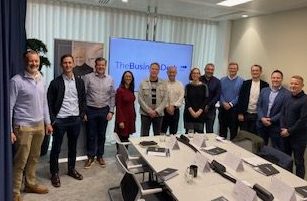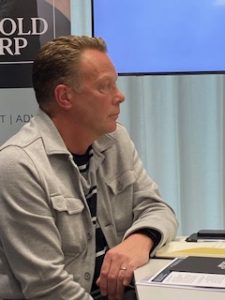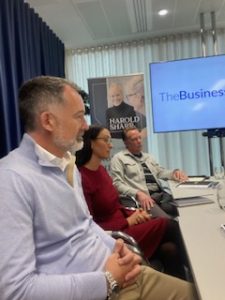Navigating business challenges in a changing landscape

On a crisp November morning, leaders from diverse industries gathered at the invitation of Harold Sharp and TheBusinessDesk.com, to discuss the evolving business landscape, and the strategies to address them.
The roundtable brought together voices from automotive, environmental services, construction, IT, and more, offering a panoramic view of the challenges and opportunities facing businesses today.

Charlotte Hinchcliffe
Charlotte Hinchcliffe, a director at Harold Sharp, set the tone for the discussion, emphasising the firm’s commitment to providing comprehensive support to businesses navigating complex financial and strategic decisions. This sentiment was echoed by her colleagues, Fred Norman and Aimie Wilson, who highlighted the firm’s success in guiding clients through digital transformations and adapting to changing market conditions, an unexpected benefit of taking a business through an audit process.
The automotive sector’s perspective was brought to the table by Jonathan Hoole of Kane International. With a turnover of £16 million and 130 employees, Hoole’s company designs and manufactures gas analyzers for the automotive and boiler industries. He emphasized the importance of organic growth and the need for effective lobbying to ensure product safety regulations keep pace with technological advancements.

Richard Bertram
Richard Bertram from the TSK Group offered insights from the workplace transformation sector. With a £60 million turnover and 105 employees, Bertram’s company has been at the forefront of reimagining office spaces. He shared valuable experiences about transitioning to employee ownership, highlighting the benefits for both the business and its workforce.
The environmental services sector was ably represented by Richard Wallace of LCM Environmental Services. With a £15 million turnover and 82 staff across three offices, Wallace’s company is tackling the challenges of fuel quality management and energy transition. He stressed the importance of maintaining a “clean” business for future acquisitions and navigating the complexities of due diligence processes.

Paul Birks
Paul Birks from Leonard Curtis brought the perspective of insolvency and legal services to the discussion. With a £40 million turnover and 300 staff, Birks highlighted the increasing demand for audits and the challenges of managing this process effectively.
Jason McKnight from Recom Solutions, a construction and property consultancy with a turnover of £30 million and over 50 staff, emphasised the importance of managing risk in construction projects and the potential of AI tools to streamline processes.
Simon Saffidine, CTO of Evolve, provided insights from the IT services sector. Saffidine discussed the introduction of AI tools in his company and the benefits of streamlining processes. He also touched on the challenges of managing salary increases and their impact on employee retention in the tech industry.
Daniel Miller from Coolkit highlighted the importance of various types of audits that his company undergoes, beyond just financial audits. He discussed how his company needs to undergo audits from the vehicle manufacturers which Coolkit adapts, as well as quality audits for ISO requirements, environmental audits, and customer audits to prove they can maintain the necessary temperature controls for their products.
He also emphasized the value that these different types of audits bring, by removing risk in their supply chain and business operations, even though they can be time-consuming. He sees value in bringing in external experts to audit their processes and provide that third-party validation.
The roundtable delved into several key themes that are shaping the business landscape:
The Impact of Economic Pressures:

Jonathan Hoole, Charlotte Hinchcliffe and Richard Bertram
Jonathan Hoole raised the issue of recent National Insurance increases and their impact on business costs. This sparked a broader discussion about managing salary increases and retaining talent in a competitive market. Richard Bertram and Richard Wallace shared their experiences of balancing these pressures in employee-owned businesses, while Paul Birks and Fred Norman discussed the use of salary sacrifice schemes as a potential solution.
The Role of Technology and AI:
Simon Saffidine led the conversation on the integration of AI tools in business processes. While acknowledging the benefits, he also highlighted the challenges of adoption and the need for a strategic approach. Jason McKnight added that in the construction industry, AI is being used to streamline project management and risk assessment.
Audit and Compliance:

Fred Norman
Fred Norman and Paul Birks discussed the increasing demand for audits and the challenges this presents for businesses. They emphasized the need for companies to be prepared and to view audits as an opportunity for improvement rather than a burden.
Skills and Talent Management:
A recurring theme throughout the discussion was the challenge of attracting and retaining skilled employees. Charlotte Hinchcliffe and Aimie Wilson stressed the importance of maintaining competitive pay scales, while also acknowledging the need for non-monetary incentives to keep employees engaged.

Amie Wilson
Adapting to Market Changes:
Several participants, including Richard Wallace and Jonathan Hoole, discussed the importance of being agile and responsive to market changes. This includes everything from adapting to new regulations to pivoting business models in response to economic pressures. Simon Harris of Avrenium said there had been a tendency towards “scope creep” as well. Once through the sales process operations get involved, relationships get built, then the questions start. “Can you just do this? Can you just do that? You’re like, why are we making no money? All that’s rechargeable. You have to make sure you go and have that conversation.”
The Importance of Strategic Planning:
A key takeaway from the roundtable was the need for businesses to engage in long-term strategic planning. Fred Norman emphasized that Harold Sharp’s role goes beyond number-crunching, extending to helping clients understand and prepare for future challenges.
The Value of Collaboration:
The roundtable itself served as a testament to the value of collaboration and knowledge-sharing across industries. Participants found common ground in their challenges and were able to offer insights from their diverse experiences.
As the discussion drew to a close, Fred Norman offered some concluding remarks on behalf of Harold Sharp. He thanked the participants for their candid insights, emphasizing that understanding the real-world challenges of running a business is crucial for providing effective advisory services.
Charlotte Hinchcliffe added her appreciation for the honesty and depth of insights shared, noting that such discussions are invaluable for shaping Harold Sharp’s approach to supporting businesses.
As the participants prepared to depart, there was a palpable sense that the roundtable had not just been a discussion, but a catalyst for new ideas and potential collaborations. The challenges facing businesses may be complex, but the collective wisdom and experience shared at the Harold Sharp roundtable offered a beacon of hope and practical strategies for navigating the road ahead.
In a world where business landscapes are constantly shifting, forums like this roundtable prove invaluable. They provide a platform for leaders to share experiences, challenge assumptions, and collectively work towards solutions that can drive growth and resilience in their respective industries.
As the group posed for a final photograph, it was clear that the connections made and insights gained would resonate far beyond the confines of the meeting room. The Harold Sharp roundtable had not just been a meeting of companies, but a meeting of minds, each committed to shaping a stronger, more adaptable business community for the future.








